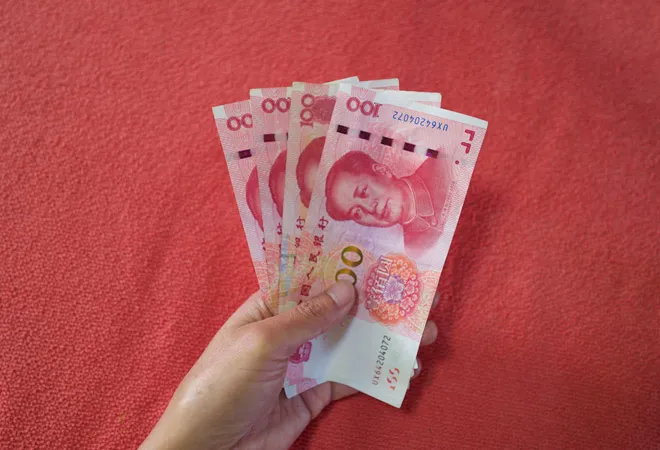 This is the 87th article in the series
This is the 87th article in the series The China Chronicles.
Read the articles here.
While the Indian startup ecosystem has developed dynamically in recent years, increasing amounts of Venture Capital (VC) has flowed into the country from various parts of the world. Of the 137 investors, which have participated in funding
Indian unicorns (as of September 2019, data on funding rounds from
Traxn), 45 are US-origin and participated in 151 funding rounds. Besides 39 native investors, which participated in 120 funding rounds, Chinese investors have been the third most active as ten of them participated in 31 funding rounds. In fact, Chinese investors have become increasingly active in the last few years and the volume of investments
has increased five-fold at $5.6 billion in 2018 compared to a mere $668 million in 2016 and around $3 billion in 2017. This article reviews key investments made by the group of ten Chinese investors and explains the patterns emerging from it.
Table: Chronology of Chinese Investments into Indian Unicorns
| Year |
|
Investor |
In which unicorn |
Funding Amount (in $) |
Further participating Investors |
| 2014 |
Jun 01 |
Tencent, Didi Chuxing |
Ola |
Undisclosed |
. |
| 2015 |
Feb 05 |
Alibaba Group |
Paytm |
213M |
SAIF Partners |
| Aug 02 |
Alibaba Group |
Snapdeal |
500M |
Foxconn Electronics, SoftBank Group, Temasek, BlackRock, Myriad Group, Premji Invest |
| Sep 29 |
Alibaba Group |
Paytm |
472M |
. |
| Nov 18 |
Didi Chuxing |
Ola |
$500M |
Tiger Global Management, DST Global, Baillie Gifford, Steadview Capital, ABG Capital, JSCapital, Falcon Edge Capital, GIC, SoftBank Group, Daniel E Neary |
| 2016 |
Aug 16 |
Tencent |
Hike |
175M |
. Foxconn Electronics |
| 2017 |
Mar 03 |
Alibaba Group |
Paytm Mall |
200M |
. SAIF Partners |
| May 22 |
Fosun |
Delhivery |
30M |
. |
| Jul 25 |
Tencent |
Byju’s |
40M |
CZI, Lightspeed Venture Partners, IFC, Sofina, Brand Capital |
| Sep 07 |
China Lodging Group |
OYO Rooms |
260M |
Hero MotoCorp, SoftBank Vision Fund, Sequoia Capital, Greenoaks, Lightspeed Venture Partners |
| Sep 13 |
China Lodging Group |
OYO Rooms |
10.2M |
|
| Oct 11 |
Tencent |
Ola |
1.1B |
SoftBank Group |
| Oct 25 |
Alibaba Group |
BigBasket |
5M |
Helion Venture Partners, Trifecta Capital, Ascent Capital, Bessemer Venture Partners, Brand Capital, Paytm Mall, The Abraaj Group |
| 2018 |
Jan29 |
Alibaba Group |
BigBasket |
300M |
The Abraaj Group, IFC, Sands Capital, Bessemer Venture Partners, Trifecta Capital |
| Feb 01 |
Ant Financial |
Zomato |
152M |
|
| Feb 07 |
Meituan |
Swiggy |
100M |
Naspers |
| April 02 |
Alibaba Group |
Paytm Mall |
453M |
SoftBank Group |
| Jun 20 |
Meituan |
Swiggy |
210M |
DST Global, Naspers, Coatue |
| Sep 06 |
Tencent |
Dream11 |
100M |
Kalaari Capital, Multiples Equity, Think Investments |
| Sep 18 |
China Eurasia Economic Cooperation Fund |
Ola |
50.2M |
Sailing Capital |
| Oct 13 |
Ant Financial |
Zomato |
210M |
. |
| Dec 20 |
Hillhouse Capital Group, Meituan, Tencent |
Swiggy |
$1B |
Naspers, DST Global, Wellington Management, Meituan, Coatue |
| Dec 31 |
Didi Chuxing |
OYO Rooms |
100M |
SoftBank Vision Fund, Grab, Lightspeed India Partners, Sequoia Capital, Greenoaks |
| 2019 |
Feb 28 |
Shunwei Capital |
Zomato |
61.9 |
Delivery Hero, Naspers, Saturn Shine |
| Mar 06 |
Fosun |
Delhivery |
413M |
SoftBank Vision Fund, The Carlyle Group |
| Mar 11 |
Tencent |
Byju’s |
35.4M |
General Atlantic |
| Mar 28 |
Alibaba Group |
BigBasket |
150M |
Mirae Asset, CDC Group |
| Aug 30 |
Hillhouse Capital Group |
Udaan |
$374 |
Altimeter Capital, , GGV Capital, DST Global, Lightspeed Venture Partners |
Source: Traxn (as of September 2019)
In the
first phase, Chinese technology majors entered the Indian market. Among the most active investors have been e-commerce giant
Alibaba, which has, together with its affiliate
Ant Financial, invested in five Indian unicorns. The first was Paytm, an online payment provider, which later spun off its marketplace business Paytm Mall and thereby allowed Alibaba to establish a
direct presence in the Indian e-commerce space. Alibaba invested in another online market place, Snapdeal, and subsequently started venturing into the grocery and food delivery businesses by backing BigBasket and Zomato. Beyond the five unicorns, significant investments include the logistics startup XpressBees and the online ticket platform TicketNow. Alibaba’s native rival
Tencent, which is best known for WeChat and operates a broad array of online services (e.g. social networks, gaming, online payments, news) in its home market, has invested in six Indian unicorns. The funded startups are active in a variety of fields, such as messaging (Hike), ride-hailing (Ola), edutech (Byju’s), food delivery (Swiggy), gaming (Dream11), and an online insurance marketplace (
PolicyBazaar). Tencent further participated in funding rounds of the former e-commerce unicorn Flipkart, and invested in startups active in online travel (Ibibo), digital banking (Nivo) and music streaming (Ganaa) domains.
Three additional major Chinese players have become active in the Indian startup ecosystem, but made fewer investments.
Meituan-Dianping (which has Tencent as its
major backer) is e-commerce platform, which offers various services such as on-demand delivery, car-hailing, bike-sharing, hotel and travel booking, movie ticketing. The company has invested in one Indian unicorn, Swiggy. In addition, Meituan-Dianping launched the bike-sharing system
Mobike in India, and entered into a strategic partnership with OYO Rooms, which is now the
second-largest hotel group in China. Another investor,
Didi Chuxing started as a ride-hailing aggregator expanding to services such as bike and car rentals, shuttle services, food delivery, financial services, among others. The company has into two Indian unicorns: Ola, which is active in its core business, and OYO Rooms. Furthermore,
Fosun offers diverse services, including industrial operations, asset management, insurance and real estate. The conglomerate has invested the unicorn Delhivery, which has become a major logistics player in India. Fosun’s portfolio further includes startups in online travel (MakeMyTrip, Ixigo), fintech (Kissht) and pharma (Gland Pharma) domains.
In a second wave of investments, capital came from an increasing number of financial investors.
Shunwei Capital, which has been established by the founder of Xiaomi, has entered the list of 10
most active VC investors in India in 2018. Shunwei has invested in the food-delivery unicorn Zomato and done smaller deals across different sectors, including social network (ShareChat, which now competes with Chinese Bytedance), commerce (Meesho, Cashify), fintech (Krazybee, ZestMoney), and content platforms (Vokal, Mech Mocha, Pratilipi). Another key investor is
Hillhouse Capital Group, which has received attention in 2018 for raising $10.6 billion for a new fund , which was the largest-ever
capital raise by a private equity firm in Asia. Hillhouse, which itself has invested in Tencent and Didi Chuxing, has invested in two unicorns, the food delivery startup Swiggy and B2B trade platform Udaan.
Two further investors,
China Lodging Group and
China-Eurasia Economic Cooperation Fund, have participated in funding rounds in Indian unicorns. China Lodging is a major hotel company, which has done a strategic investment into OYO Rooms, as the companies plan to
work together regarding to sharing of tech and IP, a joint loyalty program as well as hotel sourcing and procurement. China-Eurasia Economic Cooperation Fund is the state-backed investment fund of China, which has so far invested in Ola.
Reviewing the investments of Chinese key investors reveals some striking patterns and trends. First, they are coming in at a time when growth rates in their home market are decreasing and their “
startup funding party” is slowing down. As they look for investment opportunities abroad, India is perceived as the last big emerging market that
cannot be ignored because of its demographics. A large and young population, which extensively uses the Internet, makes India one of the
most important markets. On the other hand, in India, where funding is scarce, capital is much needed and
welcome from all sources. Compared to China, the size of the Indian startup ecosystem is still comparatively small and Chinese investors perceive the Indian market to be in a very early stage. Hence, they acknowledge the need for a
very patient, long-term approach.
Second, Chinese investors tend to invest in startups with business models, which are similar to those, which had success in China and which they believed could
replicate in India. Investments are based on the specific knowledge of sectors, bringing their considerable experience about the Chinese market. Thus, leveraging their learnings and deep domain expertise, Chinese investors are able to hedge Indian homegrown startups and help them grow big. Realizing that
being local is not their core competency (e.g. Tencent’s failure to successfully introduce its WeChat in India), they let them take the lead in the local market, and keep the option open to increase their stakes later on.
Third, initially, Chinese investors often backed market leaders, often at very high valuations. This was the case, for instance, with Alibaba acquiring stakes in Paytm (Mall) and Snapdeal, Tencent investing into Flipkart and Hike, and together with Didi Chuxing in Ola. In contrast, Fosun has made a mix of mid-to-late-stage and public equity investments and announced to focus more on
early-stage ventures. Several VCs are looking to gain a foothold here with
low-profile investments calculated to fly beneath the radar and there is a noticeable shift towards coming in early, gaining conviction and
doubling down on the companies instead of entering at a later stage. Moreover, rather than just coming and scouting for deals, they are more
actively engaging in the Indian startup ecosystem. The fact that Alibaba and several Chinese VCs have set up a
fellowship programme for entrepreneurs confirms this observation.
Fourth, some big China-backed local companies compete with global, mostly US-origin technology giants. This can be observed in several sectors. For instance, Alibaba has backed Paytm Mall and Snapdeal and thereby taken on the “
ecommerce war” with Amazon; a further competitor is homegrown Flipkart, which received an earlier investment by Tencent and was
acquired by Walmart in 2018. In the food delivery domain, Alibaba-backed Zomato and Swiggy, which has received investments from Meituan-Dianping, Tencent and Hillhouse Capital Group, compete with each other, along with UberEats and Foodpanda. Chinese ride-hailing giant Didi Chuxing, along with Tencent, and China-Eurasia Economic Cooperation Fund, have invested in Ola, which is in a competitor of Uber. Another example is Tencent, which has invested in the messenger Hike, which competes with WhatsApp, which is currently the dominant messenger in India.
Fifth, competition is not limited to only specific sectors; it also extends to ecosystems. Strategic investments made in startups in related verticals indicate that Chinese investors seek to mirror the ecosystems, which they have created in China. For instance, in its home market, Tencent has pioneered the “
swiss army knife” approach to messaging with WeChat, which has integrated e-commerce, food delivery, taxi apps, and much more. Similarly, Tencent’s investment into Hike can be seen as the first move to replicate its
chat-based empire in India. By investing in Flipkart (e-commerce), Swiggy (food delivery), Ola (taxi app), and several others, Tencent ventured into the same sectors. Another example is Alibaba, which has not only invested in startups in its core business (Paytm Mall and Snapdeal), but also secured stakes in the Indian payments (Paytm) and logistics (XpressBees) space, which form the “
iron triangle” of business and can feed off each other. Alibaba further invested into BigBasket and Zomato and made them become parts of its ecosystem: Agreements were signed to make Paytm the default provider of BigBasket, while enabling BigBasket to
cross-sell groceries on Paytm Mall,
Zomato was prohibited from entering any business segments that may hamper the interests of Paytm.
To sum up, the last few years have seen Chinese investors deepening their push into the Indian startup ecosystem. Leveraging their financial resources as well as deep expertise based on their experiences in the home market, they help Indian local startups grow big and enable them to compete with other, mostly US technology giants. Hence, Chinese players are indirectly participating in the competition for global technology leadership.
The views expressed above belong to the author(s). ORF research and analyses now available on Telegram! Click here to access our curated content — blogs, longforms and interviews.



 This is the 87th article in the series The China Chronicles.
Read the articles
This is the 87th article in the series The China Chronicles.
Read the articles  PREV
PREV


